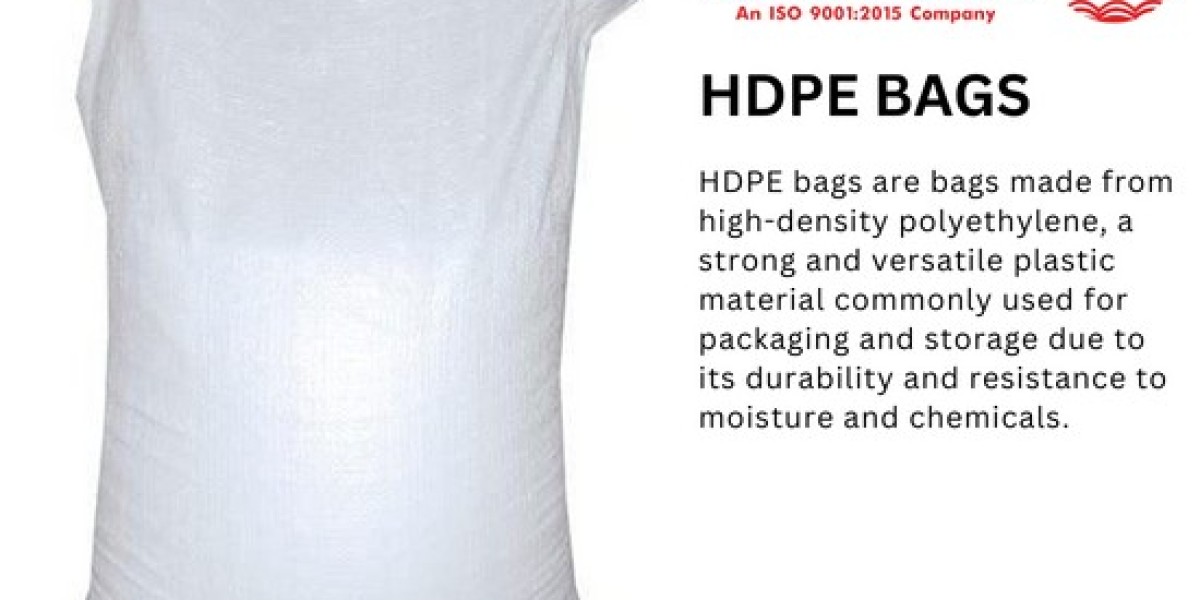In the world of packaging, HDPE Laminated Paper Bags Manufacturer in Gujarat have emerged as a versatile and reliable option, catering to a wide range of industries and applications. Known for their durability, strength, and recyclability, HDPE (High-Density Polyethylene) bags offer unparalleled functionality and environmental benefits. Whether you're in retail, agriculture, healthcare, or beyond, understanding the benefits and applications of HDPE bags can help you make informed decisions about your packaging needs.
What are HDPE Bags?
HDPE bags are made from high-density polyethylene, a thermoplastic polymer known for its strength and versatility. These bags are manufactured through a process of melting and extrusion of HDPE granules, which are then molded into various bag shapes and sizes. HDPE is chosen for its excellent moisture resistance, chemical resistance, and ability to withstand wear and tear, making it ideal for packaging solutions where durability is crucial.
Key Features and Benefits of HDPE Bags
Strength and Durability: HDPE Bags Manufacturers in Tamilnadu are renowned for their robustness and toughness, capable of holding heavy loads without tearing or puncturing. This strength makes them suitable for transporting and storing a wide range of goods, from groceries to industrial products.
Moisture Resistance: Unlike some other plastics, HDPE is naturally resistant to moisture and water vapor. This property ensures that goods stored in HDPE bags remain protected from environmental elements, maintaining their quality and integrity over time.
Chemical Resistance: HDPE bags are resistant to many chemicals, acids, and alkalis, making them suitable for packaging hazardous substances safely. This chemical resistance also extends the shelf life of packaged goods by protecting them from external contaminants.
Recyclability: One of the most significant advantages of HDPE bags is their recyclability. They can be easily recycled and reused to create new products, contributing to environmental sustainability and reducing the carbon footprint associated with packaging materials.
Cost-Effectiveness: HDPE bags offer an economical packaging solution due to their durability and recyclability. Businesses benefit from reduced material costs and lower disposal fees, making HDPE bags a cost-effective choice for packaging needs.
Versatility in Design: HDPE bags can be manufactured in various shapes, sizes, and thicknesses to accommodate different products and applications. Whether you need flat bags, gusseted bags, or custom-printed options, HDPE bags can be tailored to meet specific packaging requirements.
Applications of HDPE Bags
HDPE Woven Bags Manufacturers in Ahmedabad find extensive use across diverse industries:
Retail and Shopping Bags: HDPE bags are commonly used in retail stores and supermarkets for packaging groceries, clothing, and other consumer goods. Their strength and ability to carry heavy loads make them a preferred choice for shopping bags.
Industrial Packaging: In industries such as agriculture, construction, and manufacturing, HDPE bags serve as reliable containers for bulk materials, chemicals, fertilizers, and construction debris. Their durability ensures safe storage and transportation of industrial products.
Healthcare and Pharmaceuticals: HDPE bags are utilized for packaging medical supplies, pharmaceuticals, and healthcare products due to their hygienic properties and ability to maintain product sterility.
Waste Management: HDPE bags are crucial in waste management for collecting and disposing of household and industrial waste. Their strength and tear resistance prevent leaks and spills, maintaining cleanliness and hygiene.
Conclusion
HDPE bags stand out as a reliable packaging solution across various industries, combining strength, durability, and environmental sustainability. Their versatility and cost-effectiveness make them a preferred choice for businesses looking to enhance their packaging efficiency while minimizing environmental impact. Whether you're packaging groceries, industrial materials, or healthcare products, HDPE bags offer the reliability and performance needed to meet modern packaging challenges effectively. Embrace the versatility of HDPE bags and discover how they can elevate your packaging standards while contributing to a greener future.
FAQs About HDPE Bags
Q1: Are HDPE bags environmentally friendly?
A: Yes, HDPE bags are considered environmentally friendly because they are recyclable. They can be melted down and reused to create new products, reducing waste and environmental impact.
Q2: What are the different types of HDPE bags available?
A: HDPE bags come in various types, including flat bags, gusseted bags, resealable bags, and custom-printed bags. Each type is designed to suit specific packaging requirements and applications.
Q3: Are HDPE bags suitable for storing food products?
A: Yes, HDPE bags are safe for storing food products. They are FDA-approved and comply with food safety regulations, making them ideal for packaging perishable and non-perishable food items.
Q4: How can HDPE bags contribute to cost savings for businesses?
A: HDPE bags are cost-effective due to their durability, which reduces the need for frequent replacement. They also lower disposal costs because they can be recycled, offering long-term savings for businesses.



